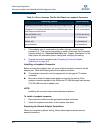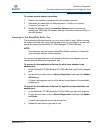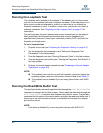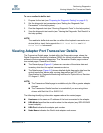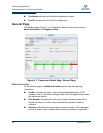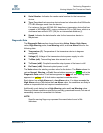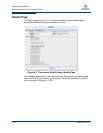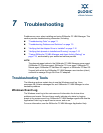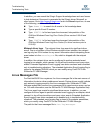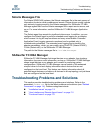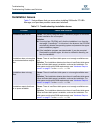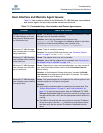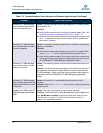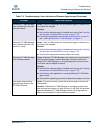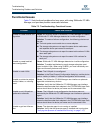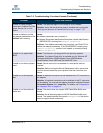
Troubleshooting
Troubleshooting Tools
7-2 SN0054651-00 F
S
In addition, you can search the QLogic Support knowledge base and user forums
to help determine if the event is generated by the QLogic driver, Microsoft, or
other source. Go to http://support.qlogic.com
and in the Search input box, do one
of the following, and then click Search:
Type Event ID to search for all events in the knowledge base.
Type a specific Event ID number.
Type 6389719 to find and open the document, Interpretation of the
QLA2xxx Windows Event Log Error Codes (Driver version 9.00.00 and
above).
Type 3346764 to find and open the document, Interpretation of the
QLA2xxx Windows Event Log Error Codes (For driver versions prior to
9.00.00).
Miniport driver logs. The miniport driver logs events for significant driver
errors. Due to a limitation of the Windows miniport driver interface, the miniport
can log only two 32-bit values for any event. Information about interpreting these
event codes is in the eventlog.txt file, which is shipped with the miniport
driver.
In addition, the miniport driver can be configured to perform extended event
logging for an adapter, which causes it to log all loop transitions and many minor
events. Extended Application Event Logging uses extra overhead and is enabled
only in troubleshooting situations. The extended Application Event Logging flag is
stored in the adapter NVRAM, which you can modify using Fast!UTIL or the
SANsurfer FC HBA Manager.
Linux Messages File
For Red Hat/SUSE Linux systems, the Linux messages file is the main source of
information for device driver problems and events. Device drivers usually indicate
only status by logging events in the Linux messages file. SANsurfer FC HBA
Manager agents also use the Linux messages file to report service errors, and so
on. For more information, see the SANsurfer FC HBA Manager Application Help.
The Linux agent logs events for significant driver errors. In addition, you can
configure the Linux agent to perform extended event logging for an adapter, which
causes it to log all loop transitions and many minor events. Extended Application
Event Logging uses extra overhead and is enabled only in troubleshooting
situations. The extended event logging flag is stored in the adapter parameters,
which you modify using Fast!UTIL or the SANsurfer FC HBA Manager.
The path for the Linux messages file is /var/log/messages.



